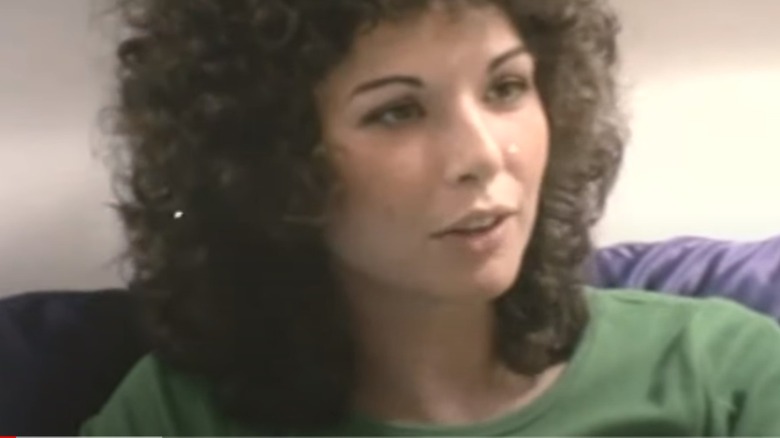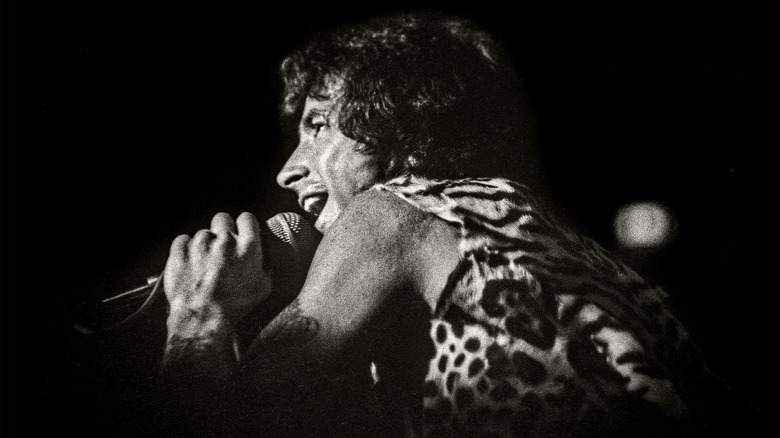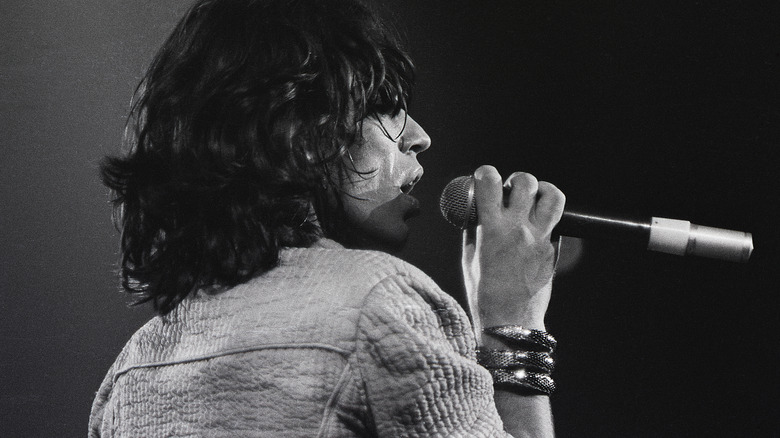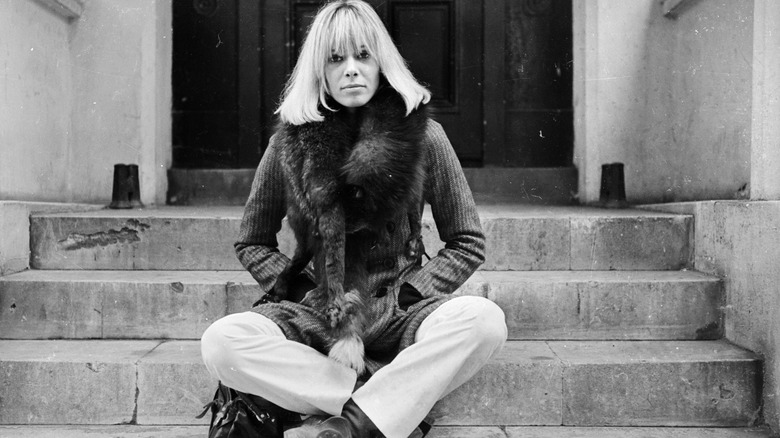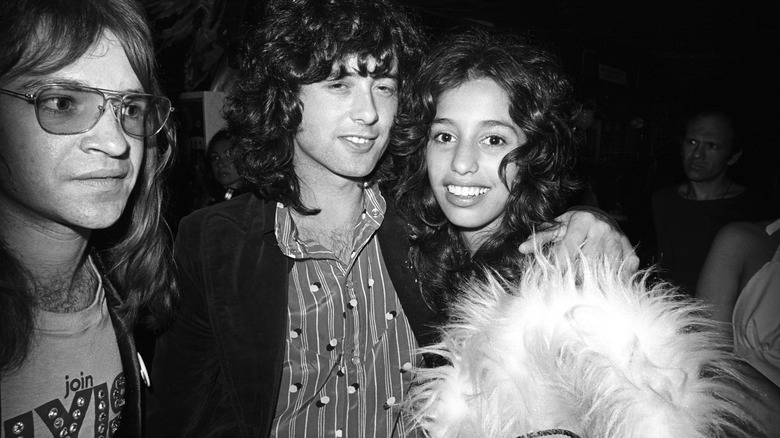Groupies Who Had Famous Songs Written About Them
First things first: The term "groupie" is kind of a loaded one, and it means different things to different people. When The Guardian took a look at what the term had meant in the 1970s and did mean in 2018, they found that even those who lived through the scene had very different opinions on the matter — and sometimes, they existed alongside each other, in the same person. Motley Crue and Guns 'n Roses groupie Roxana Shirazi said that she had gone into it knowing who she was and what she wanted ... and that just happened to be members of the band.
At the same time, though, she says: "It's never possible to have full agency [as a groupie]. From the outset, the power structure is not equal. They're famous, and unless you're famous yourself, you're not on the same plane." Similarly, Lori Mattix — the underage lover to both David Bowie and Jimmy Page — admitted that even though "I'd felt like I'd won the lottery," it wasn't a life she'd wish on anyone.
Others have spoken about being too young, too star-struck, and too uncertain to have had any say in the matter. Some avoid the term "groupie" altogether, saying that the music wouldn't exist without them in the role of the muse. Who's right? Is everyone right, depending on the circumstance? Perhaps: So let's talk about some songs that might not exist, if it weren't for the inspiration of the groupie.
Cynthia Albritton
Given that she was known as Cynthia "Plaster Caster," the song inspired by groupie-artist Cynthia Albritton is kind of obvious... at least, for KISS fans: That would be the Gene Simmons-penned song "Plaster Caster." The footnote to this is that he never apparently participated in one of her... sessions, creating statues that she referred to as her "sweet babies."
What sessions were those? Making plaster casts of the erect members of various rock stars, a massive art-school project that started with Jimi Hendrix and continued to include a who's who list of strictly male musicians, initially. That expanded into making casts of the breasts of female musicians, and she explained (via Pitchfork) just what made her work so deeply personal to her. "Their human flaws make them kind of attractive. I was shocked and delighted to find that they were as insecure as I was. That kind of made me see them in a different light... They're the same as us."
Simmons apparently had something more carnal in mind when he wrote lyrics based on her, singing, "The plaster's gettin' harder, And my love is perfection, A token of my love, For her collection." In 2023 — the year after her death — Indiana University's Kinsey Institute announced they had acquired her collection, which included molds made as recently as 2014.
Cathy Smith
While countless groupies have complicated legacies, there's perhaps none more complicated than the one left behind by Cathy Smith. In 1982, she gave an interview in which she confessed to administering a fatal dose of heroin and cocaine to John Belushi, leading to a second-degree murder conviction. About a decade before that, she transitioned from traveling with the group that would later become The Band (and allegedly giving birth to Levon Helm's daughter), to reconnecting with a singer who'd had an earlier affair with her: Gordon Lightfoot.
At the time they became serious, Lightfoot was divorced — but according to Nicholas Jennings' biography, "Lightfoot," their relationship was anything but easy. With alcohol as an ever-present third party, Smith's tendency to flirt with anyone who caught her eye meant that trust really wasn't a part of the relationship.
The pair were living in a small town outside of Toronto, and it was into Toronto that Smith went on the night Lightfoot sat down and wrote "Sundown." "I was hoping that no one else would get their hands on her, because she was pretty good-looking," he had explained. It was worry over that which led him to write what would become one of his biggest hits, penning the lyrics, "She's been lookin' like a queen in a sailor's dream, And she don't always say what she really means. Sometimes I think it's a shame, When I get feelin' better when I'm feelin' no pain."
Bebe Buell
Bebe Buell credits Ric Ocasek of The Cars as inspiring her to start making her own music, but she's still perhaps most famous as the mother of Steven Tyler's daughter, Liv. She wrote her memoir, "Rebel Heart: An American Rock 'n' Roll Journey" in 2001, and it was in a chapter titled "The Return of Elvis Costello" that she revealed she believes she was the inspiration for Prince's "Little Red Corvette."
She said that her mother was quick to point out that at a glance, it wasn't the sort of song a mother might want to hear written about her daughter. Buell says that not only was she flattered by the idea the song was inspired by her, but wrote that it "gave me the idea of stirring up a rivalry between Prince and Elvis, which was easy to do with a man like Elvis. When Elvis wanted to get me back, or let me know that he loved me, or send me cruel messages, he did it in songs."
She went on to say that Costello's "Human Hands" was so obviously about her that it had Costello's wife calling her asking questions. "She asked, 'How could he miss me? — because the lyrics refer to missing a 'darling' — if he's with me?" It was enough that it kicked off a series of daily letters written to him, which he responded to by telling her, "never to let anyone extinguish my spirit."
Linda Keith
Part of being a groupie in the 1970s involved promoting the acts they had attached themselves to, and that's what Linda Keith did with Jimi Hendrix. At the time she met Hendrix, she was involved with another famous name: Keith Richards. Does it get complicated? Absolutely. She's said (via The Guardian) that she first saw Hendrix in New York, and was instantly captivated. More than that, when Hendrix found himself without a guitar on the night that she'd invited a music exec to come see him perform, she lent him one of Richards' guitars: a white Fender Stratocaster.
Keith would later be immortalized in the Hendrix song "Send My Love to Linda," in which he wrote, "Send my love to Linda, She lit a fire way down inside, She made the sun shine in my eye, God, let me hold her once more before I die." That's an absolutely beautiful tribute, but it's not the only one she had written to her.
She was also the inspiration behind the Rolling Stones' "Ruby Tuesday." Richards would explain (via U Discover Music) that the song was written after she left him, ending their two-year relationship: "That's the first time I felt the deep cut. The thing about being a songwriter is, even if you've been f***ed over, you can find consolation in writing about it, and pour it out. Basically, Linda is 'Ruby Tuesday.'"
Rosie
AC/DC is a rock staple, and "Whole Lotta Rosie" is an AC/DC staple. But who, exactly, is Rosie? That's apparently been a question people have been asking for a long time, and while no Rosie ever came forward, it turns out that a little determination can lead to a lot of answers. Jessie Fink is the author of two books on the band, and in 2023, he published a blog post confirming that yes, he'd found Rosie... and the reason that she had never come forward as the song's inspiration.
The oft-told tale is that Rosie was a regular at their shows, and after spending the night with Bon Scott, she boasted to him that he was the 29th famous person she'd slept with. Other details were non-existent, until Fink was contacted by a source who explained that she had known the Rosie in question: Her name was Rosemaree Garcia, and she'd died in 1979. The source claimed that Garcia had dated Scott for around six months, saying, "She was a law unto herself," and further explaining that she had been a sex worker whose death had been connected to heroin and drug use.
That information led to the discovery of her death certificate, and the sad confirmation that she had died when she was just 22 years old. Journalist Dean Goodman — who tracked down her death certificate — says that Rose-Maree Carroll Garcia had died of septicemia, double pneumonia, and tension pneumothorax, which occurs when chest pressure prevents blood from reaching the heart.
Devon Wilson
If there's any rock star who lived a life that reads like a fictionalized version of a rock star, it's Jimi Hendrix. It's fitting, then, that the inspiration behind his famous "Dolly Dagger" is just as incredible — and yes, she was a very real person named Devon Wilson. Hendrix sang, "Dolly Dagger, she drinks her blood from a jagged edge, Drink up, baby. Been riding broomsticks since she was 15, Blow out all the other witches on the scene." Harsh words for a significant other? Perhaps, but at least part of those lyrics were literal.
Wilson, the story goes, hooked up with Hendrix as not only his primary girl, but as the one rounding up everything the band needed. (That, of course, meant drugs and other girls.) As some of the girls she brought back were shared with Hendrix and she got tired of sharing, she decided that what worked for him, also worked for her. Hendrix's 27th birthday was celebrated at a Stones concert, and when she hosted the afterparty, things can kind of best be summed up by accounts of Mick Jagger cutting his finger, and Wilson licking up the blood. "Jagged edge," see?
That's according to engineer Eddie Kramer, who also told Louder Sound, "Devon was a presence. Very beautiful, very commanding, with quite an edge to her. But she was funny." Wilson, however, didn't have a happy ending to her story: In 1971, she was killed when she fell out a window of the Chelsea Hotel.
Pauline
"Bodies" by the Sex Pistols is perhaps predictably dark. It starts, "She was a girl from Birmingham, She just had an abortion, She was a case of insanity, Her name was Pauline, she lived in a tree. She was a no-one who killed her baby, She sent her letters from the country." Contrary to the lyrics, though, Pauline wasn't just "no-one," and was a very real someone. She's mentioned in the Sex Pistols' biopic "Pistol," and when The Cinemaholic did a deep dive into whether or not it was a factual part of the band's history, they confirmed that it was.
Pauline was a punk rock groupie with a horrifying background: Committed to a mental institution in northern England, she was said to have been sexually assaulted by an employee before fleeing to London and establishing herself in the underground punk scene. And as to the references to abortion in the song? John Lydon has said that's all inspired by her story, too.
"She'd tell me about getting pregnant by the male nurses at the asylum, or whatever," Lydon had reportedly explained. There isn't much more that's known about the woman that inspired the pretty heartbreaking tale: Although the story was backed up by other members of the group, much of Pauline's story remains shrouded in mystery.
Cynthia Sue Wells
Groupies are, of course, well-known for their sexual liaisons — even though many will say that's only a small part of what being a groupie means. So, when John Cale (pictured) of The Velvet Underground wrote, "The bugger in the short sleeves f***ed my wife, Did it quick and split, Back home, fresh as a daisy to Maisy, oh Maisy," who was he referring to?
His wife at the time was Cynthia Sue Wells, who was also known as Miss Cynderella, and as one of the members of the GTOs, the Frank Zappa-assembled group made up entirely of groupies. The story goes that Cale — who existed in the shadow of Lou Reed for much of the band's run — wrote the song for "June 1, 1974," and it was absolutely meant to be a shot at industry staple Kevin Ayers. Ayers and Wells hooked up at around the same time the semi-live album was recorded, and not only did Cale know about it, but he was going to make it clear that wasn't the sort of thing that was going to be swept under the carpet. The bitterness is writ large on the cover, too — that wasn't the bitterness of the punk scene, that was the bitterness of a betrayed man.
Connie Hamzy
When Rolling Stone covered Connie Hamzy's death in 2021, they quoted her — and those who knew her — as saying that she'd lived her life with a few lofty goals. Grand Funk Railroad drummer Don Brewer said, "My memory of her is of a very outgoing, 'sweet' girl that wanted to be famous. That was her goal in life. May she rest in peace." Hamzy's connection with the music scene started with a Steppenwolf concert when she was 15 years old, and she later credited her mother's insistence on dropping her off at concerts early for giving her time to mingle with some of the biggest names in music.
And it was Grand Funk Railroad who did the song most commonly associated with her. In the iconic "We're an American Band," they sing, "Out on the road for 40 days, Last night in Little Rock put me in a haze, Sweet, sweet Connie, doin' her act, She had the whole show and that's a natural fact."
Hamzy has said that she considered herself a groupie from the very beginning, explaining, "...it has become an addiction. No matter how hard I try, I just can't give it up. It's the thrill, the chase, the challenge of getting to meet a famous star that lures me back time and again." And the list of stars is a long one that includes Joe Walsh, Don Henley, the entirety of ZZ Top, and even Vanilla Ice. There's another song that was reportedly written about her, too: Cheap Trick's "Standing on the Edge."
Sable Starr
Look back through the music industry, and it quickly becomes clear that there are a lot of things that are deeply troubling, particularly the idea of the baby groupie, teenagers as young as 12 and 13. And it's not as if it was an industry secret: When Iggy Pop sang "Look Away" about Sable Starr, it didn't really leave much room for interpretation.
"I slept with Sable when she was 13, Her parents were too rich to do anything, She rocked her way around LA, 'Til a New York Doll carried her away." In another verse: "Sable had a baby back at her folks', Me, I went straight and serious, too, There wasn't much else that I could do." It wasn't the only song written about Starr, either: Ted Nugent's "Jailbait" also left little to the imagination.
When fellow baby groupie Lori Mattix talked to Thrillist in 2015, she said that Starr had already firmly established herself in the groupie scene by the time they met: They were both 14, and at the time, both Starr and her sister were involved with Iggy Pop. Mattix recalled her own involvement with David Bowie and how it drove a wedge between the two, a scene that would play out again with Jimmy Page. Mattix shared some insight as to what it was like in the cutthroat circle: "Especially after the Bowie incident, I was truly afraid Sable would beat me up, kill me, crucify me, 86 me out of Hollywood. She was the queen of the groupies."
If you or anyone you know has been a victim of sexual assault, help is available. Visit the Rape, Abuse & Incest National Network website or contact RAINN's National Helpline at 1-800-656-HOPE (4673).
Patti D'Arbanville
There's little question as to the song that was inspired by Patti D'Arbanville: Her name is, after all, right in the song title. "Lady D'Arbanville" was the single off Yusuf/Cat Stevens' Mona Bone Jakon, in which he sang, "My Lady D'Arbanville, Why does it drive me so? But your heart seems so silent, Why do you breathe so low?"
The song seems to have been plucked out of another era, and it's fitting that the video is set in a mansion dripping with mystery. According to the official story, Stevens and D'Arbanville were in a serious relationship that included the time he spent recovering from tuberculosis, and it ended with her return to the U.S. and him sharing the song with her over the phone. "I cried when I heard it," she said, "because that's when I knew it was over for good."
D'Arbanville stayed in the groupie scene, and became a good friend and trusted companion of groupie mainstay Pamela Des Barres. In the latter's book, "Let's Spend the Night Together," D'Arbanville has a whole chapter dedicated to her. Des Barres revealed that it was the song that had first intrigued her, and that she later got the whole story. D'Arbanville had been dating a friend of Stevens' when she met him, and the relationship had lasted for about a year, until she realized that he was actually, legitimately in love with her. "It freaked me out. ... I was feeling like I couldn't give him what he wanted. I felt trapped..."
Catherine James
In Pamela Des Barres' book, "Let's Spend the Night Together," fellow groupie Patti D'Arbanville described Catherine James as "the most beautiful creature I had ever laid eyes on." Des Barres says there was quite a bit of very hostile competition between her and James... initially. It was perhaps predictably over Jimmy Page, but Des Barres says he was just the beginning. James was associated with names like Denny Laine of The Moody Blues (telling him she was 18 years old, and not 15), but it was John Mayall (pictured) who wrote "The Elusive Miss James."
"I read about her in the magazine, The writer painted her in colors of a queen, Other people said bad things instead, So I was curious to check up what I'd read, But askin' around, She couldn't be found, Strange, elusive Miss James," Mayall wrote.
Jackson Browne's "Under the Falling Sky" was also inspired by James: She had a young son by Laine at the time she and Browne got together, and she's said that they were absolutely, head-over-heels in love when he wrote the song for her. It wouldn't last, but it seems as though she had some regrets about that: "Jackson was a sweet and romantic lover, the one I should have stayed with," she told Des Barres. James left him to return to her son's father, and she said that he even dropped her off at the airport.
Barbara Cope
Some groupies relied on gimmicks to make sure they got the attention they were craving, and that was the case with Barbara Cope. For her unique use of the foodstuff when she slept with musicians, she was given the nickname of the Butter Queen — reportedly by a member of The Moody Blues — but it was the Rolling Stones who gave her a shout-out in their song, "Rip This Joint": "Kiss me quick, baby, won'tcha make my day, Down to New Orleans with the Dixie Dean, Across to Dallas, Texas with the Butter Queen."
Cope's mention alongside Dallas wasn't an accident. Buddy magazine's one-time editor, Kirby Warnock, has said that pretty much everyone in the city knew who she was — especially the musicians she hung out with, which included everyone from the Stones to David Cassidy, Led Zeppelin... and somewhere around 2,000 others, give or take.
Her fame wasn't lasting, though, and when she was killed in a house fire in 2018, The Dallas Morning News reported that her neighbors had no idea who she was. She was long retired, but not forgotten in music lore: Cope just gets a mention in the Stones' song, but Three Man Army's tribute to her was much more obvious. Called "Butter Queen," the song asked what many people who weren't in the know might be asking, "How come they call you butter queen?"
Julia Holcomb
Although many groupies continued to embrace the lifestyle in hindsight, that's not the case with everyone. Julia Holcomb participated in a documentary called "Look Away," where she said that she only thought she had gone into things under her own terms. She was 16 when she set her sights on Aerosmith frontman Steven Tyler. In 2022, Tyler was named in a lawsuit filed after the lifting of the statute of limitations on cases of sex abuse involving minors. Rolling Stone quoted Holcomb (now Julia Misley) as saying, "I want this action to expose an industry that protects celebrity offenders, to cleanse and hold accountable an industry that both exploited and allowed me to be exploited for years, along with so many other naive and vulnerable kids and adults."
Holcomb's claims are largely supported by Tyler's own 2011 memoir, which Holcomb says convinced her to come forward with her own statement about events that include Tyler allegedly forcing her to have a late-term abortion. She's also said that he wrote a song about her: "Seasons of Wither," released on the "Get Your Wings" album.
"Oh woe is me, I feel so badly for you, Oh woe is me, I feel so sadly for you in time, Bound to lose your mind, Live on borrowed time, Take the wind right out of your sail." Tyler, meanwhile, has said that the song was inspired by long, late-night walks down darkened roads, but Holcomb has said that the song's devil was Tyler himself, and the "blues-hearted lady" was her.
Mick Jagger's (alleged) anonymous liaison
Devon Wilson was one of the many groupies with her finger on the pulse of countless rock stars, and while Jimi Hendrix might be the one who immortalized her as "Dolly Dagger," she was also tight with the Rolling Stones. The story about the rather dubious yet allegedly very real origins of the Stones' "Stray Cat Blues" came through her to author David Henderson, and was recounted in his book, "'Scuse My While I Kiss the Sky." Wilson said, "[Mick Jagger] told me he wrote it about a certain chick. ... When he was in California the girl called him and said, 'Thanks for writing that song about me.' He was shocked, because he didn't think she could have recognized herself. But she did, and it completely freaked him."
And this is going to get icky. The official version of the lyrics include the lines, "I can see that you're 15 years old, No, I don't want your I.D., And I can see that you're so far from home but that's no hanging matter, It's no capital crime." Yikes? It's going to get worse, as the live version of the lyrics changes the girl's age to just 13.
Far Out Magazine took a look at the claims, and said that while no one's been able to confirm the story or the identity of the girl, that's not actually surprising. At the time the song came out, it wasn't the sort of thing anyone would think twice about, and it wasn't anything out of the norm.
Anita Pallenberg
Anita Pallenberg is perhaps music's best example of a groupie-turned-integral-influencer: Her impact on shaping the look and sound of the Rolling Stones has been acknowledged for a long time, and according to The Guardian, she was also the inspiration for one of their most famous songs: "Gimme Shelter."
Keith Richards wrote about the song's genesis in his autobiography, saying that he had written it when Pallenberg opted for beefing up her acting resume with a movie that included some steamy sex scenes with Mick Jagger. The whole thing had put him in a pretty ferocious mood, and he wrote (via Louder Sound), "It was just a terrible f***ing day, this incredible storm over London. So I got into that mode — looking at all these people... running like hell."
That wasn't the only song that Pallenberg would influence, and she was also said to be the trippy lady of "She's a Rainbow." "Have you seen her in all gold? Like a queen in days of old, She shoots colors all around, Like a sunset going down, Have you seen a lady fairer?" the song asks.
The LA Queens
Morgana Welch was part of the baby groupie scene that centered around Los Angeles, and in an interview with Please Kill Me, she said that they didn't even know they'd been dubbed the L.A. Queens until Led Zeppelin released the song "Sick Again" in 1975. (Pictured is Lori Mattix.) Fast forward to the 21st century and a post-MeToo world, and it's kind of hard to listen to. It includes lyrics like, "One day soon you're gonna reach sixteen, Painted lady in the city of lies," and "Come on, flash it, flash it in my eyes, Said you dug me since you were 13, Then you giggle as you heave and sigh."
According to Welch, it was a magical time when the biggest music fans could get, well, up close and personal with all their favorite musicians, and she added that it was a time when women were coming into their own sort of independence unlike anything they'd ever had before. Welch is one of many who condemn the double standard that exists between men and women.
In Rolling Stone's 1975 interview with Robert Plant and Jimmy Page, it was Plant who explained what the song meant: "The words show I feel a bit sorry for them. ... One minute she's 12 and the next minute she's 13 and over the top. Such a shame. They haven't got the style that they had in the old days... way back in '68."




